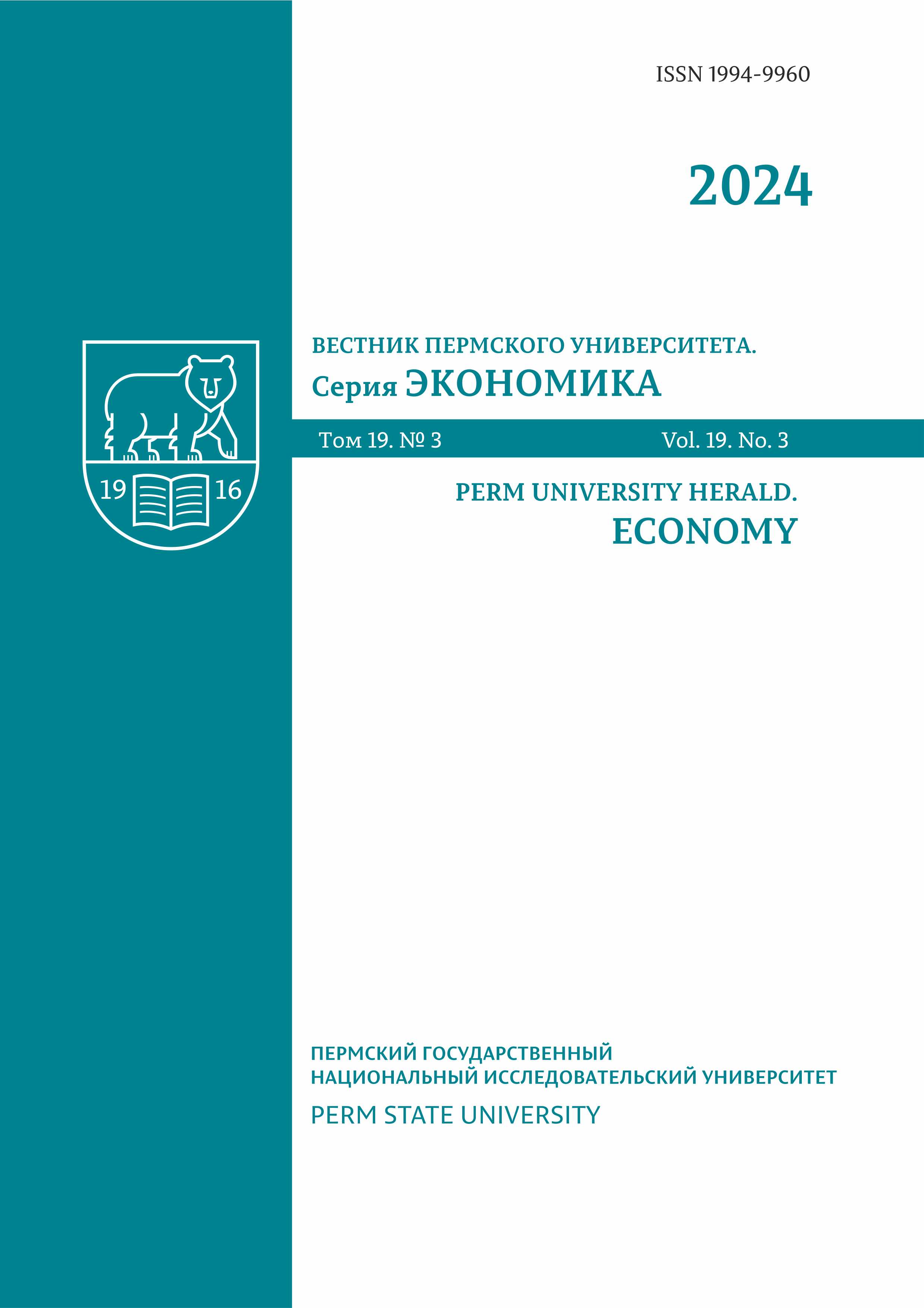Modeling of sales processes in the manufacturer – marketplace system
DOI:
https://doi.org/10.17072/1994-9960-2024-3-284-299Abstract
Introduction. E-commerce is becoming one of the priority channels for the distribution of goods. Marketplaces with their large segments of the target audience and a wide range of logistics, marketing, information, and other services are the most extensively growing e-platforms. It seems relevant to use mathematical tools to describe various schemes of interaction between manufacturers and marketplaces since by now scientific papers consider only theoretical issues of cooperation between manufacturers and marketplaces and do not outline the elements of this system.
Purpose. The study investigates the basic schemes of interaction between manufacturers and marketplaces and develops a universally applicable economic and mathematical model of interaction between manufacturers and marketplaces.
Materials and Methods. The article examines theoretical and methodological approaches to the organization of cooperation between manufacturers and electronic marketplaces to identify the cooperation models relevant for the Russian marketplaces, their features, advantages and disadvantages.
Results. The authors developed a fulfillment-based economic and mathematical model of the organization of the manufacturer’s sales system provided the goods are safely stored in the warehouse of the marketplace. The model defines the functions of the manufacturer’s revenue as the volume of sales on the online platform and the costs of warehousing, transportation, marketing promotion, commission fee and other related costs to maximize the manufacturer’s profit, determines restrictions on the number of goods sold, stored and manufactured, the volume of goods in stock and the seller’s rating on the marketplace.
Conclusion. The paper describes a universally applicable model for manufacturers using the first-level sales channel as a marketplace with no distributors, wholesalers, and retailers, and marketplaces providing a range of logistics services, including warehousing, sorting, and delivery of goods to customers. Further research suggests developing a model for manufacturers’ interaction with marketplaces to explore possible channels for the distribution of products in case goods are stored in their own warehouses and retail chains’ warehouses.
Keywords: marketing operations, marketplace, manufacturer, sales expenses, sales system modeling, economic and mathematical modeling
For citation
Uvarova L. A., Ivanov D. Yu. Modeling of sales processes in the manufacturer – marketplace system. Perm University Herald. Economy, 2024, vol. 19, no. 3, pp. 284–299. DOI 10.17072/1994-9960-2024-3-284-299. EDN SBAMGQ.
REFERENCES
- Tskhadadze N. V. Electronic commerce: Place and role in the modern world. Bulletin of the Moscow University of the Ministry of Internal Affairs of Russia, 2023, no. 4, pp. 241–245. (In Russ.). DOI 10.24412/2073-0454-2023-4-241-245. EDN KEQPBW
- Kozlyaeva E. V., Krylova I. Yu. Online sales: Choosing a sales channel in modern conditions. Economic Vector, 2022, no. 1 (28), pp. 143–147. (In Russ.). DOI 10.36807/2411-7269-2022-1-28-143-147. EDN NTJSJR
- Kotler F. Osnovy marketinga. Kratkii kurs. Moscow, 2007. 656 p. (In Russ.).
- Kaluzhskikh I. A. Razrabotka kompleksa modelei i metodiki soglasovannogo vzaimodeistviya v optovoi torgovle: dis. … kand. ekon. nauk. Samara, 2008. 157 p. (In Russ.).
- Shendrik P. V. Theoretical specifics of the functioning of marketplaces. Mezhdunarodnyi nauchno-issledovatel'skii zhurnal = International Research Journal, 2022, no. 10 (124), Article 74. (In Russ.). DOI 10.23670/IRJ.2022.124.36. EDN ABHKFK
- Zhokhova V. V. The role of the marketplace in choosing the sales channel of a manufacturing enterprise. The Territory of New Opportunities. The Herald of Vladivostok State University of Economics and Service, 2022, vol. 14, no. 3 (53), pp. 42–59. (In Russ.). DOI 10.24866/VVSU/2073-3984/2022-3/042-05. EDN LDAIGO
- Kawa A., Wałęsiak M. Marketplace as a key actor in e-commerce value networks. Logforum, 2019, vol. 15, no. 4, pp. 521–529. DOI 10.17270/J.LOG.2019.351
- Karavaeva Е. D. Planning of logistics costs in sales of goods via the marketplace. Kreativnaya ekonomika, 2020, vol. 14, no. 4, pp. 587–598. (In Russ.). DOI 10.18334/ce.14.4.100799. EDN FZOLBW
- Veselova A. Marketplace vs online shop. Economic and Social Development: Book of Proceedings. 62nd International Scientific Conference on Economic and Social Development (Lisbon, 19–20 November 2020). A. Lorga da Silva, T. Rados, O. V. Kaurova (Eds.). Varazdin, Croatia, Varazdin Development and Entrepreneurship Agency, 2020, pp. 30–36. Available at: https://clck.ru/3Cnrbu (access date 04.05.2024).
- Dyukova О. М. Development of electronic trade logistics: From online stores to marketplaces. Izvestiâ Sankt-Peterburgskogo gosudarstvennogo èkonomičeskogo universiteta, 2022, no. 3 (135), pp. 111–115. (In Russ.). EDN VTNBTS
- Maier E., Wieringa J. Acquiring customers through online marketplaces? The effect of marketplace sales on sales in a retailer’s own channels. International Journal of Research in Marketing, 2021, vol. 38, iss. 2, pp. 311–328. DOI 10.1016/j.ijresmar.2020.09.007
- Keller А. V., Okolnishnikova I. Yu. Marketing analysis of key trends in the development of the market of transport and logistics services. Bulletin of the South Ural State University. Ser. Economics and Management, 2022, vol. 16, no. 4, pp. 141–152. (In Russ.). DOI 10.14529/em220415. EDN PJOHXH
- Kutliakhmetov N. U. Vybor modeli dostavki tovara na marketpleis kak sposob uvelicheniya prodazh. Logistics – the Eurasian Bridge: Proceedings of XVII International Applied Research Conference (Kransoyarsk, 27–30 April 2022), Part 2. Krasnoyarsk, 2022, pp. 139–143. (In Russ.). EDN PHMQNR
- Gulyaeva M. K. E-commerce as an organization development tool. Global scientific discussions in the era of digitalization: From theory to practice: Materials of the XVI International Scientific and Practical Conference (Ryazan, December 29, 2023). Ryazan, 2023, pp. 253–256. (In Russ.). EDN HUDIND
- Mikhailyuk М. V. The marketplace as a factor in the progressive transformation of e-commerce in Russia: Logistic aspect. Economic Sciences, 2019, no. 3 (172), pp. 57–61. (In Russ.). DOI 10.14451/1.172.57. EDN SJMNOG
- Chkalova О. V., Kopasovskaya N. G., Bolshakova I. V. Electronic marketplaces as a driver for the development of the food retail market. Vestnik of Lobachevsky State University of Nizhni Novgorod. Series: Social Sciences, 2022, no. 2 (66), pp. 38–47. (In Russ.). DOI 10.52452/18115942_2022_2_38. EDN QBXWQS
- Simakina М. А. Digital transformation of brands: Issues of interaction with marketplaces. Bulletin of Science and Practice, 2023, vol. 9, no. 2, pp. 247–252. (In Russ.). DOI 10.33619/2414-2948/87/29. EDN VBMJCI
- Sheynina М. А. Role of marketplaces while implementing various types of advertising campaigns. Practical Marketing, 2023, no. 3 (309), pp. 42–48. (In Russ.). DOI 10.24412/2071-3762-2023-3309-42-48. EDN VXQEGU











